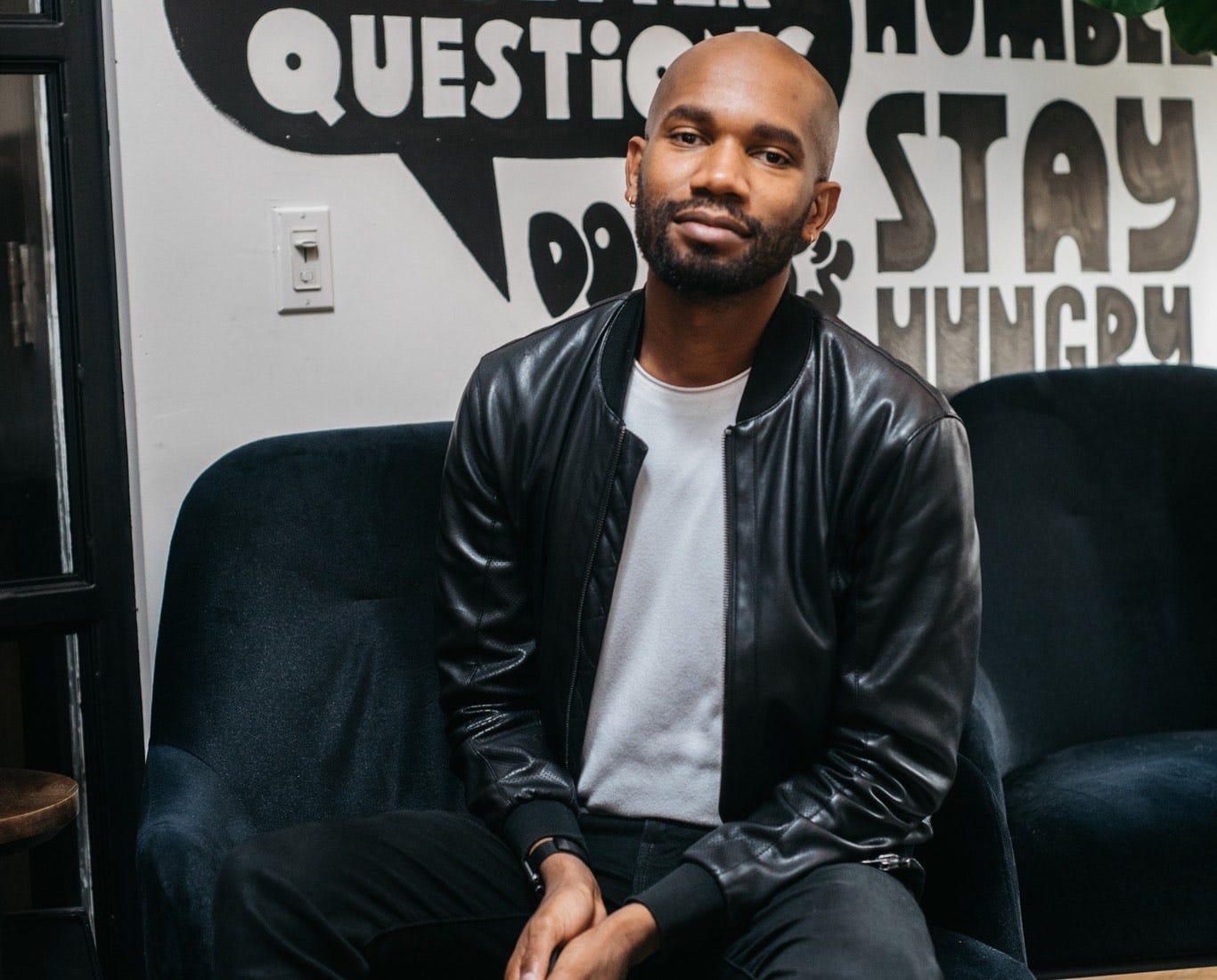Supercreator Daily: Looks like another setback on police reform
This morning, we had reason for optimism. But hours later, one of the issue’s top negotiators was speaking a different tune.
While issues like infrastructure and voting rights have attracted most of the headlines, lawmakers have pressed forward behind the scenes to grapple with another national crisis: police violence.
For months, Democratic Sen. Cory Booker of New Jersey and Republican Sen. Tim Scott of South Carolina have attempted to negotiate a bipartisan agreement on the George Floyd Justice in Policing Act — a comprehensive bill sponsored by California Democratic Rep. Karen Bass and passed by the House in March — that would reform policing practices and increase law enforcement accountability.
And this morning there was reason for optimism. John Bresnahan, Anna Palmer and Jake Sherman at Punchbowl News reported that the negotiators were circulating text for review and that a deal could come this week or next. This would align with Booker and Scott’s self-imposed “June or bust” deadline and come weeks after Congress failed to deliver the bill to President Joe Biden’s desk to sign by the one-year anniversary of Floyd’s murder last month.
But hours later, Alexander Bolton at The Hill reported a different tune from Scott. “We’ve got a lot of work left to do,” the senator said, while adding that the two sides are still far apart on a potential deal jeopardizing the likelihood a deal in the next three weeks. On Tuesday, Scott added: “For us to get where we need to go, there’s going to have to be paper. If we don’t have paper in the next week or two, I think [it] would be very hard for us to make a deadline that is June 28th … [or] whatever the last week we’re here [before our next recess].” (“Paper” refers to the printed legislative text that lawmakers review and markup prior to a vote.) Spokespeople for Booker, Scott and Bass did not respond to a request for comment from The Supercreator.
The George Floyd Act would cut down or bar the use of chokeholds, restrict the transfer of surplus military gear that police departments often deploy to terrorize protestors during demonstrations against state violence, and develop a national registry of police officers fired for illegal behavior to prevent them from bouncing from precinct to precinct without accountability.
It would also reform qualified immunity, the doctrine created by the Supreme Court that shields on-duty officers from liability for their misconduct — even if they break the law — unless they violated clearly established law. Republicans argue that eliminating this protection would harm police recruitment; Democrats are demanding that police officers be liable for serious misbehavior. Bresnahan, Palmer and Sherman and Punchbowl report that the final version of the bill will allow alleged victims of police brutality to sue either police departments, cities or whatever governmental agency has control over police officers, but not the officers themselves. I was unable to get anyone to confirm this on the record though. But if true, this would be a win for Scott, who according to Leigh Ann Caldwell and Frank Thorp V at NBC News, is adamant that qualified immunity not be eliminated and the burden should be placed on the departments. (Colorado and New Mexico are the only two states to end qualified immunity.)
Here’s the thing though: Since police officers are almost always shielded from criminal prosecution, the only meaningful recourse for victims’ families is civil lawsuits, which are often paid by the city and subsidized by taxpayers. Since 2015, the 20 US cities and counties with the biggest police departments have paid over $2 billion since 2015 for alleged misconduct and civil rights violations, according to a Wall Street Journal analysis in 2020 by Scott Calvert and Dan Frosch. During this period, New York City, the nation’s largest police department, has paid more than $1.1 billion in settlements. Chicago is second at about $253 million. Los Angeles County has paid out more than $238 billion. “Cities are effectively using their residents to mortgage police violence — a proposition that may grow less and less palatable as families’ finances are depleted by other circulating disasters,” Brentin Mock wrote last summer for Bloomberg.
Not to mention, police are still killing people at the same rate as before Floyd was murdered, indicating that officers are unafraid of being held accountable by the status quo. Data from Mapping Police Violence showed that there were only six days through the first four months of the year in which police across America didn’t kill anyone. Through May 21, 89 Black people were killed by police. (Black people are three times more likely to be killed by police than white people and 1.3 times more likely to unarmed when killed by the police.)
It’s not just Black people who are disproportionately killed by police either: Latinos are killed by police at nearly double the rate of White Americans, according to numbers from the Police Violence Report. “Experts cite several reasons the Latino community has often been left out of the debate about policing and reform. The historical legacy of police brutality against Black people is well-known and documented, dating back to the slave patrols,” Silvia Foster-Frau wrote at The Washington Post. “Many Americans view immigration as the primary concern of Latinos. The lack of a standardized system for reporting police killings means that Latino victims are often categorized as Black or White. In addition, Latinos as a group include a variety of cultures with different lived experiences.”
No matter our lived experiences, we should be able to exist in a world where the people sworn to protect and serve are accountable when they fail to do so. The George Floyd Justice in Policing Act could move us closer to this ambition hopefully sooner rather than later.
Here’s everything else you should know today:
Politics
Prices increased in May by 5 percent compared with a year ago. Although this is the largest increase since the Great Recession, the Federal Reserve won’t rush to raise interest rates until the labor market has time to heal.
More than six in 10 people across 16 countries said they have confidence in President Joe Biden to do the right thing in world affairs. In 12 of the surveyed countries, 75 percent expressed confidence in Biden compared to the paltry 17 percent for that bum Donald T**** in 2020.
The Senate unanimously passed legislation to officially designate the Pulse nightclub a national memorial. Saturday marks five years since a gunman killed 49 people after opening fire in the Orlando gay nightclub.
House Democrats will reportedly introduce a package of five bills that will prohibit the tech giants from discriminating against rivals or buying potential competitors. Under four of the bills, the Justice Department or FTC would limit the conduct, mergers and data use of designated platforms.
Rep. Byron Daniels has been blocked from joining the Congressional Black Caucus. Daniels, a Black Republican from Florida, voted against certifying Joe Biden’s election win.
The Transportation Security Administration is on the verge of a worker shortage. The agency is currently offering $1,000 as a recruitment incentive for volunteers to handle non-screening functions such as on-boarding for new hires and management of security lines at airports for up to 45 days.
The New York State Senate passed the Gender Recognition Act (GRA) that simplifies the process for trans people who wish to change their gender markers and names on legal documents. The law would also add the “X” gender marker as an option and allow for “self-certification” of legal gender, removing the requirement that a medical provider “prove” a trans person’s gender.
PARENTS magazine released an online hub of educational resources and tips for parents and caregivers of LGBTQ+ kids and teens. The guide includes info on how parents and guardians can build an inclusive community and support network for their queer loved ones.
Business
Amazon pledged to spend $12 million on a new workplace-safety initiative with the National Safety Council. Amazon and the group are also launching the MSD Pledge to convince other employers to join it in tracking musculoskeletal disorders (MSDs) and developing programs to reduce them.
Netflix launched an e-commerce site. The site features caps, necklaces, charms and hoodies and enables the streaming service to ad another revenue stream as it competes with a crowded market of rivals like Disney+.
Online grocery app Instacart committed up to $1 million to amplify Black-owned consumer packaged goods (CPG) brands within the Instacart marketplace. Eligible brands will receive Instacart Ads credits to use with the company's flagship Featured Products offering throughout 2021.
Technology
Facebook launched Venmo-like QR codes for person-to-person payments. The feature, which can be found under the “Facebook Pay” section in the settings of Messenger, allows anyone to send or request money through Facebook Pay even if they’re not Facebook friends.
Twitter is adding a newsletter subscription button to the profile pages of users with an account with Revue, the newsletter software Twitter acquired this year. The company said its goal is to help newsletter writers better leverage their existing followers so they can grow their subscriber bases.
Free Preview: In Conversation with Ryan Sides
For this week’s Supercreator Interview, I checked in with Ryan Sides, a writer and digital strategy executive. During our chat, Ryan shared how he accidentally stumbled his way into digital and creative strategy, why he uses his platform to talk openly about salary negotiation and other once-taboo subjects and what he misses most about our hometown Dallas. Here’s a snippet of our convo:
What’s an underrated (or under-appreciated) skill people who don’t do what you do would be surprised to learn is critical to being successful at what you do?
Listening. And by listening, I mean being in tune with as much of internet culture and online sentiments as possible. That's the only way to know what rules you have to adhere to strictly, which ones you can bend and which ones you can break.
The full interview will be featured in this weekend’s issue of the Supercreator Select, a new exclusive bonus newsletter for premium subscribers to The Supercreator and includes weekly interviews, my Ask Michael Q&A column and a breakdown of the stories I’ll be covering in the upcoming week so you can focus your attention on the stories that matter to you and your creativity.
In addition to the Supercreator Select, premium subscribers enjoy:
Commenting privileges and invitations to members-only pop-up discussions
24/7 access to the full archive
A link to my private calendar to book Supercreator One-on-Ones, virtual office hours to discuss whatever’s on your mind and get face-to-face professional support
Subscriptions also enable The Supercreator to deliver an ad-free reading experience minus aggressive pop-ups, annoying auto-play videos or third-party sponsored content. Subscribe to The Supercreator to get the Select sent straight to your inbox this Sunday. Already a subscriber? Login at any time to manage your account.
Read All About It
Brittany Wong at HuffPost on the child-free by choice movement:
When it comes to perception of child-free women, we’ve got a long way to go. The expectation to bring kids into the world is still so strong that a 2016 study found that voluntarily child-free people inspired “significantly greater moral outrage” than those with two children.
Those who are child-free may be stigmatized but overall, they’re happier; a 2018 study that looked at 40 years of data on children and happiness in America found that married mothers were less happy than married women without kids.
Research also suggests that parents in the U.S. face the largest “happiness gap”compared to people without children, a disparity that is largely attributed to the country’s lack of family-friendly social policies like subsidized child care, paid vacation and sick leave.
Scott Martelle at The Los Angeles Times on post-pandemic capitalism:
Many jobs and careers are fluid. The median amount of time workers spent with their current employer before the pandemic was 4.6 years, according to the Bureau of Labor Statistics, but that varied widely by age. For workers between the ages of 55 and 64, the median tenure was 10.1 years; for workers between ages 25 and 34, the median was 2.8 years. Union contracts tend to protect the tenure of longer-serving workers during layoffs, leaving workers who have less tenure, and who often are younger, more at risk for layoff. Younger workers have more time to recover financially from a job loss though they risk derailed career trajectories. Older laid-off workers often have trouble landing a comparable new job at a time in their lives when they should be maximizing earnings and savings for retirement. We need to find ways to both keep younger workers on an upward trajectory and help older workers remain in the work force, while shoring up retirement income options for all.
Elizabeth Bruenig at The Atlantic on America’s dangerous obsession with innocence:
To put it succinctly: Innocence cases indicate that some capital sentences are unfair, but decades of studies on death-qualified juries; race, gender, and immigration-status bias among jurors; law enforcement and prosecutorial misconduct; weak forensic science and poor representation at trial all suggest that a fair capital sentence is virtually impossible. Ultimately the fight should be waged not against particular injustices, but against the unjust system itself.
Sydney Bauer at The Daily Beast on gender euphoria:
Gender euphoria makes everything about being trans click, and reveals transition to be the wonderful self-fulfilling experience it is. It is hard to explain gender euphoria to cisgender people because rarely do they ever have to contemplate the gender they’ve always lived their lives as. But for trans people who understand what it is like to have that feeling, gender euphoria is one of the best things to experience.
While “gender euphoria” is not a clinical term, its root comes from euphoria being an antonym for the word dysphoria, which has been around since the 1970s. The term has been used by the trans community to show how feelings can emerge that are the opposite of the clinical distress that some trans people need to get a diagnosis of to have access to gender-affirming health treatments.
Rachel Aroesti at The Guardian on the return of Reply All, the Gimlet Media podcast:
Reply All is not the first podcast to try and restore its reputation after a media storm, but it is one of the most high-profile. However, it was unlikely that Spotify-owned Gimlet would give up the show without a fight: a beloved podcast brand is a big commodity these days. But maintaining that value means establishing the source of Reply All’s success. Is it its peerless dedication to internet ephemera? Distinctive storytelling? Or, perhaps, the genuine, longstanding friendship at the show’s core?
Alyssa Bereznak at The Ringer on the legacy of Keeping Up with the Kardashians:
Nearly 293 episodes later, the family’s self-perpetuated fame is clearly a feature, not a bug. Far before TikTokers were live-streaming themselves sleeping, Kris and Ko. pulled back the curtain juuust enough so we could see the mechanisms of the celebrity industry. As the show’s success fueled the family’s personal makeovers, its members became a living advertisement, oversharing the minute details of their wardrobe, interior design, beauty treatments, makeup routines, workouts, diets, and plastic surgeries. Eventually, the show morphed from cable network oddity to the nucleus of a far larger Kardashian-Jenner-industrial complex, and became a blueprint for navigating the culture of influence that now permeates modern life. As KUWTK rounds out its 20th and final season this week, the family has expanded its tentacles so far that the reality TV show—their founding text—almost feels like an afterthought.
Michael’s Pick
Glossier Cleanser Concentrate ($16): I already had plans to replenish my empty mask duo, but I may give this clarifying face was a try since all things Glossier are 20 percent off through Monday.
Thanks for reading! I appreciate you for sharing part of your day with The Supercreator. See you next week. —Michael





